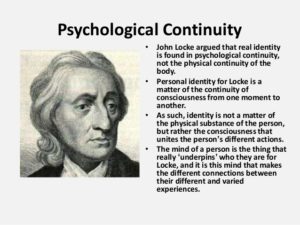
Ship of Theseus
Does Identity Change?
“The Ship of Theseus was rebuilt over the centuries as wood rotted and broke, so at what point did it stop being the original, and when did it become something else?” Thus begins a popular article to discuss the issue of identity and changes in identity (UNTE).
Now, notice the focus of the question which leads to a false dilemma logical fallacy in addition to the confusion of using terms that are not defined such as, identity. The question focuses exclusively on the physical aspect of the ship since the ship does not have a metaphysical property despite Neo-platonism’s belief of perfect forms beyond the physical realm.
Philosopher’s have long debated the issue of change and what makes up changes, especially as applied to people. When do you change? Do you change? When you say you change,what do you mean? Do you mean that your molecules have changed? These change constantly and you would be correct. However, does this make you a different person? I believe everyone would agree that you would stay the same person. If you have an organ transplant, would this make you a different person? This was the issue discussed in Mary Shelley’s book, “Frankenstein” before films turned the concept into a “horror” story with little resemblance to the original concept. Let us look at a philosopher popular with Americans since it was his “natural law” concept that became the foundation for America’s, Constitution, John Locke. Below is a graphic summarizing his beliefs about people and change.

John Locke would be classified as an Empiricist philosopher. He believed that you can only change through your sensory inputs (sight, smell, hearing, touch, taste); however, the Empiricists had to “fudge” their philosophy to allow for concepts that were beyond these senses such as beauty, emotions and even God. Thus, they also included experience, your personal experience. Thus, John Locke said that one can change in identity but not in physicality. We can agree with this in essence but we still have a problem with definitions. What is identity?
Now, you may find all this boring and pointless; however, it is of great importance to the Christian. The world, to include the pseudo-science intellectuals, cannot adequately define identity even though many works, large and small, have been written on this subject. The Bible uses the terms spirit and soul (He 4:12-13). I use the soul to refer to that essence God created at conception which is uniquely you. However, there is also a part that can change and I refer to this as spirit. Our verse in Hebrews discusses that these two elements are different; however, the Bible is not clear how they are different. The problem is that we have no sense that can detect the non-physical so any explanation would not make sense to us. We have no frames of reference to clearly understand the components. Therefore, I have provided some definition for the issue of identity. Your identity is formed from both your soul and spirit. You cannot change your essence. The Bible is clear on that issue. You are born in iniquity, sin, and cannot change to a sinless state on your own. That is called works and Judaism failed miserably at self-change even to the point of murdering their Messiah Who came to give them true change. The Church Age, or dispensation of First Fruits, has fared little better to the point of murdering or disenfranchising those that seek to stay true to the exegetical teachings of the Scriptures.
How does one change? Change is an act of God that occurs with salvation; that is, one becomes a “new creation” in Christ during salvation (2Co 5:17). That which is you is both the same, soul, and different, spirit (my understanding). I believe this is why Christians act begin to act differently after salvation because they are different! Our behavior, thoughts and words change because their source changes. The problem comes from the fact that we stay in our fleshly bodies that still have the sin part. Thus, Christians are pulled in both directions as Paul discussed in Romans chapters seven and eight.
I phrase it thusly, when we are left to our own devices; that is, when the Holy Spirit allows us to be tested or experience adversity, we will respond from our flesh. When the Holy Spirit moves through us, when we are weak and are unable to do anything, then we show Christ-likeness because He is acting through us. How do we know when we are exhibiting Christ-likeness? When our thoughts, words and deeds mirror the Ten Precepts, commonly but erroneously called the Ten Commandments. You cannot live these from your old nature because everything proceeding from the flesh is sinful since the source is sinful. Likewise, everything proceeding from the new nature is sinless because the source is holy, like Christ’s nature. The problem we face is consistency.
The more immature a believer the more often one will function from the flesh and live by works. The believer may be well-intended and sincere but ignorant, this is the situation Paul describes in Romans chapter seven. When he is acting from his flesh, which he does when he acts without the Spirit flowing through him, he cannot accomplish good no matter how hard he tries. Do you think you do any better? Paul understood that it was only when the Spirit led him or worked through him that he accomplished any good. In essence, when the Spirit works through us He does the work and we get to share in the credit.
Therefore, when we stand before the Bema Seat of Christ, we will give an account for our thoughts, words and deeds to include the times we squelched or suppressed the Spirit. We will be rewarded when we do not hinder the Spirit working through us. Notice the pattern? If we do anything, it is works! If we do nothing, it is works! If we do not hinder the Spirit, He uses us, then it is of Christ and Christ alone Who then shares His glory with us. Many Christians act as if they are doing Good and will be rewarded with many crowns which is nothing more than a, “saved by grace but live by works” mentality prevalent in many Evangelical circles. If we are saved by grace then we can only live by grace – resting in Christ so that as it was “Sola Christus” in the beginning, it remains “Sola Christus” throughout our existence forever!
When it comes time to shed our old bodies for our new bodies we will still be the same “new creation”. Christ was the same after His resurrection as He was before; except, His body had changed. He exchanged His “flesh and blood” body, which always longed to sin, for a “flesh and bone” body which will always long to remain sinless. This is our desired haven to which He will bring us at our appointed time, Amen!

